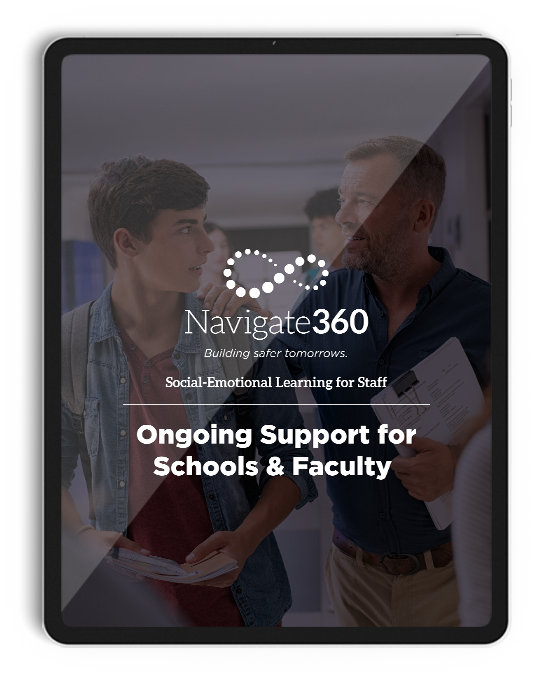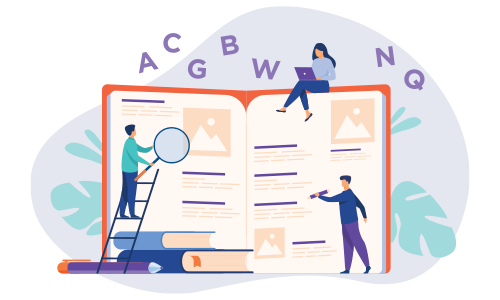Suite360 for Staff
Tools to Help Faculty Succeed & Grow
When teachers and staff better understand the needs of students, social-emotional learning (SEL) programs are more effective. With SEL for Staff, districts can invest in the success of students and staff alike. SEL for Staff:
- Helps staff support students
- Provides emotional wellness & professional development opportunities
- Offers ongoing support for schools & faculty

Overview and Benefits
Social-Emotional Learning for Staff
Helping teachers and staff support a positive school climate and thrive professionally is the goal of Suite360 for Staff.


Helping Staff Support Students
- Lessons position all school staff to take an active role in helping students’ social-emotional learning
- Improve SEL program outcomes and content delivery with consistency across all stakeholders
- Promote a more positive school environment in which students feel comfortable
Emotional Wellness & Professional Development
Improving mental and emotional wellbeing among staff promotes a more positive campus atmosphere and a safer place for students.
- Lessons that help staff grow professionally and improve their own emotional wellbeing
- Programs that empower staff to learn to care for their own social-emotional needs and mental health
- Lessons that benefit all school staff across the district

Meet the Navigate360 Social-Emotional Learning Curriculum Advisory Board
Tamara Gibson-Alonso, Ed.D, MPH
Tamara Gibson-Alonso has served as a passionate health educator and promoter in Florida for more than two decades. Having taught science and health to middle and high students in Florida for more than 10 years, Tamara's philosophy in life is to educate, develop and inspire students and communities to lead healthier lifestyles.

Becky Haas
Becky Haas is an international advocate and trainer on using a trauma-informed approach, the Adverse Childhood Experiences (ACEs) study and Positive Childhood Experiences (PCEs) study. She is a pioneer in creating trauma informed communities.

Shomari Jones
Shomari Jones is the Director of Equity and Strategic Engagement in the Bellevue (WA) School District. He serves as a powerful advocate for the experiences of students of color to help district leaders identify, confront, disrupt, and dismantle structures that limit the potential of those students. Shomari designs and facilitates thoughtful district professional development that nurtures impactful conversations around racial inequity, inequality, and the over-arching impact institutional racism has on students of color.

Jean Sharp
For over 30 years, Jean Sharp has led content development and instructional design teams in the creation of digital learning solutions that meet the needs of today's K-12 students and educators.

Implementing a Successful SEL Program
Ongoing Support for Schools & Faculty
Implementing a successful SEL program requires more than just evidence-based methodology and expert insight—schools and districts need a way to monitor multiple variables to ensure success. Navigate360 makes it easy for stakeholders and staff to monitor SEL programs, ensure accountability and guarantee accurate reporting.


Transparent Records & Reporting
Suite360 for Staff features hundreds of topics to help students grow into successful adults and citizens.
- Digital records can be accessed anywhere for quick reference and secure documentation
- Secure access ensures accountability among reporters
- Universal integration with existing SIS systems
Navigate360’s scalable architecture ensures that SEL programs can be successfully implemented in districts and schools of any size with speed and efficiency.
Adjustable Programs Based on School & Student Needs
Suite360 for Staff features guidance on hundreds of topics to help students grow into successful adults and citizens.
- Culturally informed lessons ensure sensitive issues are addressed appropriately
- Support for multiple languages and accessibility
- Regular updates keep content relevant in an ever-changing world
Scalable and customizable software allows districts to tailor their programs to the diverse needs of schools and students to ensure an inclusive and safe environment to learn and grow.

What Do Customers Think of Suite360 for Staff?
Frequently Asked Questions
Looking for answers about Suite360 for Staff?
You have questions about Suite360 for Staff, and we have answers! Use our frequently asked questions to help you find the answers you need to help you determine if Social-Emotional Learning for Staff is right for your organization.
If you don’t find the answer you need, please use the button below to contact us.

What is social-emotional learning and why is it important to my students, families and faculty?
Navigate360’s social-emotional learning curriculum offers a comprehensive and robust solution for appropriate character development and positive mental health, social and emotional wellness, behavior intervention, and restorative practices for schools of all sizes.
What does the term CASEL stand for?
The term CASEL is short for Collaborative for Academic, Social, and Emotional Learning. CASEL is an organization dedicated to advancing social and emotional learning around the world. To learn more about CASEL, please visit https://casel.org.
How was the social-emotional learning curriculum created, and how does it help students, families and faculty?
The CASEL-aligned curriculum is scaffolded by grade and provides an on-demand sequenced learning program for students, staff and parents. In addition, the fully customizable platform offers robust resources and lesson plans that are guided and flexible to meet the needs of each school.
How many lessons are included with the social-emotional learning curriculum?
Navigate360 provides evidence-based, professionally developed solutions for districts designing and implementing SEL programs that fully align with the CASEL framework. Navigate360 offers the largest SEL library with over 1,800 lessons.
Why should we choose Navigate360's social-emotional learning curriculum?
We offer the most extensive SEL library for schools, with thousands of scaffolded lessons for students, staff and families. Intervention and restorative practices turn behavioral infractions into learning opportunities and reduce recidivism. Robust mental health and prevention lessons address critical and timely issues facing students, staff and families today.
Guide
The Complete Guide to Social-Emotional Learning
Creating safe learning environments requires an emphasis on social and emotional safety as well as physical safety. A critical component is a solid, evidence-based social-emotional learning (SEL) curriculum that helps students succeed academically, socially and emotionally. Aligned with the core competencies set by CASEL, one of the pioneers of social-emotional learning, Navigate360 SEL provides crucial character development and restorative curriculum to students of all ages, genders and cultures.
Additional Resources
How to Prioritize Educators’ Mental Health & Avoid Burnout with SEL
Teachers are the backbone of the education system, and a large body of research suggests healthy, happy teachers are essential to ensuring quality student education.
Learn More4 Strategies for Superintendents when Implementing a Social-Emotional Learning Curriculum
The efficacy of SEL in the classroom requires a well-established foundation of support, educators with developed SEL skills, and accurate data for continuous improvement.
Learn MoreHow to Get Districtwide Buy-In for Social-Emotional Learning
When SEL is implemented into teachers’ lesson plans, students can learn the social and emotional skills they need to succeed in and out of the classroom.
Learn MoreContact Navigate360
Request a Demo of Suite360 for Staff
Discover how you can use Social-Emotional Learning for Staff to improve school violence prevention and awareness. Speak with one of our Safety Specialists today.





